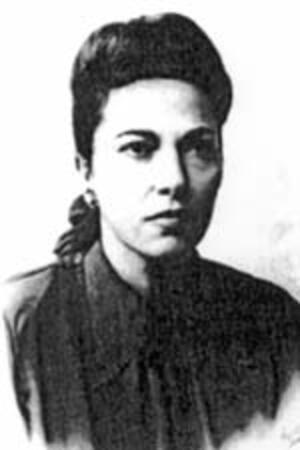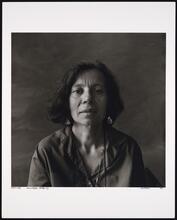Blume Lempel
Blume Lempel used stream-of-consciousness, flashback, and free association in her writing to create unique stories with themes rarely seen in Yiddish literature: eroticism, incest, and rape. Born in Galicia, Lempel began to write while living in Paris between 1929 and 1939. However, her brother discouraged her from publishing her work, citing her lack of formal education. In 1939 Lempel immigrated with her husband and two children to New York, where she began writing again. Her first short story was published in Der Tog in 1943, and her first novel was serialized in the Morgn Frayhayt newspaper in 1947. Lempel’s stories were subsequently sought after by editors of numerous periodicals. She only wrote in Yiddish, and much of her work remained untranslated until very recently.
Themes in Lempel’s Writing
Blume Lempel was a master of stream-of-consciousness, flashback, free association and eroticism—all rare in Yiddish literature. Her modern short-story style was appropriate to her themes, which were often daring: incest—Oedipus in Brooklyn (1981), rape—Aleyn in Eynem (Alone Together, 1989) and the ambivalent attraction of one woman to another (Correspondents, 1992).
Although she also wrote personalized Holocaust stories, many of her settings were very American. She blended feelings about the songs of Frank Sinatra with thoughts of a lover, her sick mother, her stepmother, and other memories glimpsed as if in a cracked mirror (“Gezangen nit Derzungen”; Songs One Has Not Finished Singing). She said her modern style developed subconsciously. “I feel I do not borrow from anyone.”
Publications
Recognition came slowly. Her first short story was published under the pseudonym of Rokhl Halpern in the daily Yiddish newspaper Der Tog in 1943. Her novel, Tsvishn Tsvey Veltn (Between Two Worlds), was serialized in the Morgn Frayhayt in 1947, yet mention of her work was omitted from the eight-volume Lexicon of New Yiddish Literature, published by the Alveltlekher Yidisher Kultur-Kongres in 1957; she was finally included in the supplement published in 1986. She wrote only in Yiddish and received the Atran award (1985), the I. J. Segal Prize for Yiddish Literature (Montreal) for her book, A Rege fun Emes (A Moment of Truth, 1981) and the Zhitlowsky prize (1989).
Her short stories were sought after by editors of periodicals such as Di Goldene Keyt, Di Tsukunft and Yiddishe Kultur and were translated into English in Bridges, Midstream and the book Found Treasures. A very modest person, Lempel thought people must be talking about someone else when she heard her work being praised. In a Yiddish interview taped in her home in Long Beach, New York, in 1992, she stated that she could have published more than two books but shied away from the business side of writing. Her books are collections of some of her short stories: A Rege fun Emes and Balade fun a Kholem (Ballad of a Dream, 1986).
Early Life in Galicia & Paris
Lempel was born in Khorostkov, Ukraine (104 km N of Chernivtsi [Chernovitz]) to Abraham and Pesha Pfeffer. Her mother died when she was twelve and her father, a Term used for ritually untainted food according to the laws of Kashrut (Jewish dietary laws).kosher butcher, remarried. Though he provided a fine education for his son, he believed a girl needed to know nothing more than how to sew on a patch and cook. As a result, she attended a heder for girls and a Hebrew folkshul briefly as a child and was later tutored by a man whose only expertise was in German. She had no systematic education but was kept at home to look after the cows. She was on her way to Palestine in 1929 to live out her Zionist yearnings when she stopped off in Paris to visit her brother, Yisroel, six years her senior. He had fled there because he had been hunted as a communist in Galicia. She recalled her childhood memories of soldiers piercing her bed with bayonets as they searched for him.
In Paris, where she remained for nine years, she attended night school, worked illegally in a pocket-book factory, married Lemel Lempel, a furrier who died in 1985, and bore her son Paul in 1935 and her daughter Yolanda in 1937. She started to write, but was discouraged by her brother, who told her that only an educated person could write. In fact, she had so little faith in her ability to write that she destroyed all her work. (Her brother was killed by the Germans after she was safe in the U.S.)
Immigration to the United States
In 1939 the Lempels moved to New York where her son Steven was born in 1945 and where she attended classes at the New School for six years. Her husband’s nephew, Michael Klahr, joined the family after World War II; all three boys celebrated Lit. "son of the commandment." A boy who has reached legal-religious maturity and is now obligated to fulfill the commandmentsbar mitzvah.
Lempel read widely and preferred the work of I. L. Peretz to that of Shalom Aleichem. She retained her ability to speak French and in the course of an interview spoke at length in French to her nephew Robert, who was telephoning from Paris. Once in the U.S., she again attempted to write, having been stirred by news of the Holocaust. She had no literary encouragement or environment, but would retreat to her writing after her husband left for work at his fur business in New York. In June 1992, when Yiddishist Troim Katz Handler, accompanied by four members of a New York City Leyenkrayz (Yiddish reading circle), visited her at Long Beach, where Lempel had lived since 1950, Lempel said it was the first time she had been interviewed. Much of her works remains uncollected and untranslated. Writing made her feel free. She rewrote and edited her own work extensively and never began writing without dictionaries.
Critic Alexander Shpiglblat wrote of her, “Her prose always burrowed into the depths of the soul, pushed aside veils, and revealed that which was hidden.”
Blume Lempel died in her Long Beach home on October 20, 1999.
Selected Works
A Rege Fun Emes. Tel Aviv: Y. L. Perets, 1981.
Balade Fun A Holem. Tel Aviv: Farlag “Yisroel-bukh,” 1986.
Oedipus in Brooklyn and Other Stories. Translated by Ellen Cassedy and Yermiyahu Ahron Taub. Simsbury, CT: Mandel Vilar Press; Takoma Park, MD: Dryad Press, 2016.
Bauman, Mordecai. “Blume Lempel, di Shrayberin un der Mentsh.” In Yiddish Forverts. December 3, 1999.
“Ikh Bin ...” Yiddish biographical notes, Yiddishe Kultur. November 1989.
Leksikon fun der Nayer Yidisher Literatur. Supplementary volume. 1986.
Lempel, Blume. Interview by Troim Katz Handler. Taped interview in Yiddish. Long Beach, New York, 1992.
Lempel, Paul and Steven Lempel. Interview by Troim Katz Handler. By telephone, 2003.
"Oedipus in Brooklyn: Reading Resources." Yiddish Book Center, https://www.yiddishbookcenter.org/language-literature-culture/great-jewish-book-club/2019-book-club-resources/oedipus-brooklyn-reading.
Phillips, Aliza. Obituary. Forward in English. October 29, 1999.
Schaechter, Sore-Rokhl. Obituary. Forverts in Yiddish. November 5, 1999.




